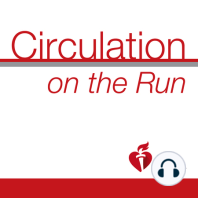17 min listen
Circulation February 16, 2021 Issue
ratings:
Length:
28 minutes
Released:
Feb 15, 2021
Format:
Podcast episode
Description
This week, Circulation on the Run highlights the articles that are part of the Go Red for Women issue. Please join Senior Associate Editors Sana Al-Khatib and Biykem Bozkurt as they provide summaries for the articles found in this special 5th Edition of Go Red for Women. TRANSCRIPT BELOW Dr. Sana Al-Khatib: Greetings. And welcome to this podcast that will showcase the contents of the Fifth Annual Go Red For Women Issue of Circulation. I am Sana Al-Khatib. I am a Professor of Medicine at Duke University and an electrophysiologist. And I am a Senior Associate Editor for Circulation. And I'm delighted to introduce my co-editor for this issue, Dr. Bozkurt. Dr. Biykem Bozkurt: Thank you, Sana. I'm Biykem Bozkurt, Professor of Medicine from Baylor College of Medicine in Houston. And I'm also a Senior Associate Editor at Circulation. And we're delighted to do this podcast. We'll be covering very exciting articles. We're very proud of our Go Red For Women Issue. Dr. Sana Al-Khatib: And you're exactly right, Biykem. We are indeed excited about the content that we will be sharing with you. And I will actually start with a couple of articles, tackling arrhythmias and covering some important topics in this field. So the first paper is actually an original research article that summarizes the results of sex and the outcomes of catheter ablation in the CABANA trial. And as you know Biykem, CABANA was a randomized clinical trial of patients who were either older than 65, or if they were younger than 65. They had to have risk factor, at least one risk factor for stroke. And those patients who had AFib were randomized to catheter ablation strategy versus pharmacologic strategy. In this particular secondary analysis of the CABANA trial, the authors looked at association between sex and outcomes of catheter ablation. And this is a really important question in the field of electrophysiology because several prior studies had suggested that women may be at an increased risk of adverse events and complications from invasive procedures. Dr. Sana Al-Khatib: So it was really good to see the results of this analysis and some of their findings were as follows. They enrolled 819 women in CABANA Biykem, which is a really good number because it accounted for 37% of patients enrolled in that trial. And this is something that we all strive to do in terms of enriching clinical trials with good women representation. And 1,385 of the patients were men. And compared with men, women had some baseline characteristics that were different. They were older. They were more likely to be symptomatic to present with paroxysmal atrial fibrillation. And when they looked at the outcomes of women, they found that the risk of complications was actually pretty infrequent in both sexes. And there was no indication that women had a higher risk of complications, so that was really reassuring to see. And you may recall that in the main trial and when they analyze data based on the intention to treat principle, they found no significant difference in the primary endpoint between ablation and pharmacologic therapy. Dr. Sana Al-Khatib: And just as a reminder, the primary endpoint was a composite outcome of deaths, disabling stroke, serious bleeding, or cardiac arrest. And in this secondary analysis focused on sex differences, they again found no difference in that primary outcome between ablation and pharmacologic therapy, regardless of sex. But when they looked at the risk of recurrent AFib, that was definitely significantly reduced in patients undergoing ablation. And that was true for men as well as for women although it seemed that difference was even larger for men. Dr. Sana Al-Khatib: I would have loved to see some data on quality of life Biykem, but these results are definitely reassuring and certainly indicate that in our female patients that we see in practice who are symptomatic with atrial fibrillation, passive ablation should certainly be considered as one of the treatment
Released:
Feb 15, 2021
Format:
Podcast episode
Titles in the series (100)
Circulation January 24, 2017 Issue: Circulation Weekly: Your Weekly Summary & Backstage Pass To The Journal by Circulation on the Run
